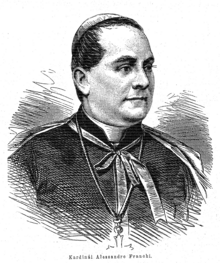Alessandro Franchi
Alessandro Franchi (born June 25, 1819 in Rome , Papal States , today Italy ; † July 31, 1878 ibid) was Cardinal State Secretary .
Life
He was born the son of the notary Vincenzo Franchi, studied in the Roman seminary, where he distinguished himself through his significant talent and successful hard work. As a result, Franchi gained the favor of the Cardinal Secretary of State Lambruschini , was by Pius IX. Raised Monsignor in 1846 and sent to Emperor Ferdinand of Austria in 1848 to persuade him to voluntarily cede his Italian lands, which he did not succeed in doing.
In 1853 he was appointed interim chargé d'affaires in Madrid , in 1856 titular archbishop of Thessalonica and nuncio in Florence . In the same year Franchi also became His Holiness's House Prelate .
At that time Florence was the capital of the Grand Duchy of Tuscany . In Florence Franchi played an outstanding part in the fight against Cavour's policy, which was striving for the unity of Italy . After the end of the Grand Duchy in 1859, Franchi returned to Rome and became State Secretary for Church Affairs. In 1868 he went to Madrid for the second time, this time as nuncio ; recalled after Isabella's expulsion in 1869, he took part in the preparations for the First Vatican Council . When the schism broke out in the Armenian Church in 1871 and the Porte favored the anti-infallibilists, Franchi was sent to Istanbul to win the local sultan for the Vatican and to help the infallibilist Patriarch Hassun to regain general recognition. He achieved his goal through negotiations with the Grand Vizier Ali Pasha , but the death of the latter prevented the implementation of the agreed measures.
On December 22, 1873, Franchi was accepted as a cardinal priest with the titular church of Santa Maria in Trastevere in the college of cardinals and in 1874 appointed prefect of the congregation De Propaganda fide . After Pius IX. Death he took part in the conclave of 1878 , which Leo XIII. chose. There he was considered a papabile , but was defeated by the future pope in the first ballot. He was appointed Cardinal Secretary of State by the new Pope. In contrast to the rather rugged Pius IX. With the consent of the Pope, he adopted a moderate policy towards the European powers and had already achieved not insignificant successes in Bavaria and Prussia when he was suddenly killed on July 30, 1878 by an attack of malar fever (not without suspicion of poisoning).
Web links
- Entry on Alessandro Franchi on catholic-hierarchy.org
- Franchi, Alessandro. In: Salvador Miranda : The Cardinals of the Holy Roman Church. ( Florida International University website), accessed January 8, 2013.
Individual evidence
| predecessor | Office | successor |
|---|---|---|
| Alessandro Cardinal Barnabò |
Prefect of the Congregation De Propaganda Fide 1874–1878 |
Giovanni Cardinal Simeoni |
| personal data | |
|---|---|
| SURNAME | Franchi, Alessandro |
| BRIEF DESCRIPTION | Cardinal Secretary of State |
| DATE OF BIRTH | June 25, 1819 |
| PLACE OF BIRTH | Rome |
| DATE OF DEATH | July 30, 1878 |
| Place of death | Rome |
